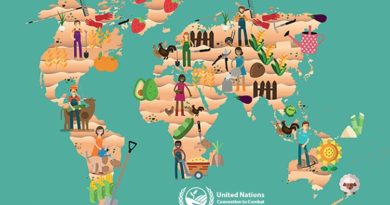UN declares 2021 to 2030 ‘Decade on Ecosystem Restoration’
The UN Decade on Ecosystem Restoration, declared by the UN General Assembly, aims to massively scale up the restoration of degraded and destroyed ecosystems as a proven measure to fight the climate crisis and enhance food security, water supply and biodiversity.
The degradation of land and marine ecosystems undermines the well-being of 3.2 billion people and costs about 10 per cent of the annual global gross product in loss of species and ecosystems services. Key ecosystems that deliver numerous services essential to food and agriculture, including supply of freshwater, protection against hazards and provision of habitat for species such as fish and pollinators, are declining rapidly.
Restoration of 350 million hectares of degraded land between now and 2030 could generate USD 9 trillion in ecosystem services and take an additional 13-26 gigatons of greenhouse gases out of the atmosphere.
The Decade, a global call to action, will draw together political support, scientific research and financial muscle to massively scale up restoration from successful pilot initiatives to areas of millions of hectares. Research shows that more than two billion hectares of the world’s deforested and degraded landscapes offer potential for restoration.
The Decade will accelerate existing global restoration goals, for example the Bonn Challenge, which aims to restore 350 million hectares of degraded ecosystems by 2030 – an area almost the size of India. Currently 57 countries, sub-national governments and private organizations have committed to bring over 170 million hectares under restoration. This endeavor builds on regional efforts such as the Initiative 20×20 in Latin America that aims to restore 20 million hectares of degraded land by 2020, and the AFR100 African Forest Landscape Restoration Initiative that aims to bring 100 million hectares of degraded land under restoration by 2030.
Ecosystem restoration is defined as a process of reversing the degradation of ecosystems, such as landscapes, lakes and oceans to regain their ecological functionality; in other words, to improve the productivity and capacity of ecosystems to meet the needs of society. This can be done by allowing the natural regeneration of overexploited ecosystems, for example, or by planting trees and other plants.
Ecosystem restoration is fundamental to achieving the Sustainable Development Goals, mainly those on climate change, poverty eradication, food security, water and biodiversity conservation. It is also a pillar of international environmental conventions, such as the Ramsar Convention on wetlands and the Rio Conventions on biodiversity, desertification and climate change.
Currently, about 20 per cent of the planet’s vegetated surface shows declining trends in productivity with fertility losses linked to erosion, depletion and pollution in all parts of the world. By 2050 degradation and climate change could reduce crop yields by 10 per cent globally and by up to 50 per cent in certain regions.




